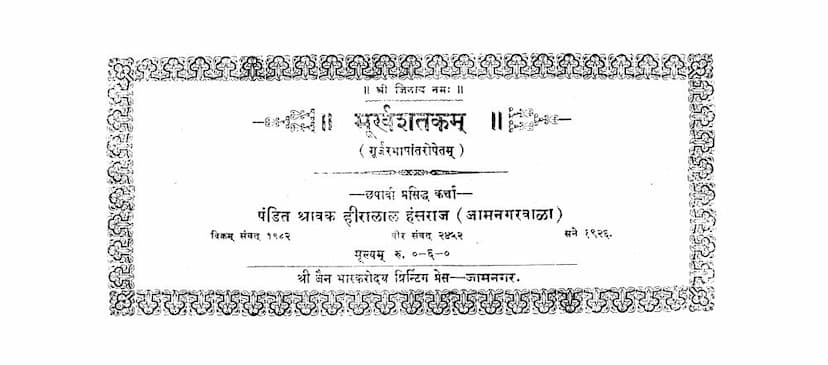Murkhshatakam
Added to library: September 2, 2025

Summary
The provided text is a Jain scripture titled "Murkhshatakam" (Centum of Fools) by Pandit Shravak Hiralal Hansraj. It describes a hundred characteristics that define a foolish person. The scripture is written in Gujarati with Sanskrit verses.
Here's a breakdown of the key themes and content:
Overall Purpose: The "Murkhshatakam" aims to educate individuals by outlining various behaviors and attitudes considered foolish according to Jain principles. By understanding these characteristics, readers are encouraged to abandon them and cultivate virtues leading to spiritual progress and liberation.
Key Themes and Categories of Foolishness:
The scripture lists numerous types of foolishness, which can be broadly categorized:
-
Lack of Self-Awareness and Wisdom:
- Boasting about one's own knowledge while in the presence of scholars.
- Not believing visible evidence.
- Being arrogant about one's intellect and refusing good advice.
- Being talkative, claiming to be a scholar, and being fearless due to that mistaken belief.
- Becoming puffed up by praise.
- Being a mischief-maker through sarcastic remarks.
-
Poor Judgment and Decision-Making:
- Engaging in activities that are against one's nature or profession (e.g., a merchant engrossed in sensual pleasures).
- Hoping for profit from a greedy king or justice from a wicked ruler.
- Developing affection for someone of the Kayastha caste (a bureaucratic class, implying misplaced trust).
- Being fearless in the face of a cruel minister.
- Seeking medical advice while healthy, or eating unhealthily while sick.
- Abandoning one's own people due to greed.
- Being lazy when there's an opportunity for profit.
- Being quarrelsome over small gains or disputes.
- Having fleeting enthusiasm for spiritual practices.
- Squandering inherited wealth.
- Imitating royalty out of arrogance.
- Criticizing superiors publicly.
- Displaying misery in times of suffering but forgetting it in happiness.
- Spending excessively to protect meager possessions.
- Consuming poison merely for testing purposes.
- Seeking wealth through alchemical practices (like mercury) that are destructive.
- Becoming arrogant due to self-importance.
- Being driven to self-harm by anger.
- Constantly wandering without purpose.
- Insisting on watching a battle even after being injured.
- Making enemies of the strong and then peacefully sleeping.
- Maintaining a grand appearance with little wealth.
-
Misplaced Trust and Affection:
- Believing the words of prostitutes.
- Having faith in deceptive appearances.
- Trusting strangers with financial matters.
- Being envious of those who give good advice.
- Being universally trusting and unaware of worldly affairs.
- Marrying a young girl while being old.
- Explaining scriptures that have not been heard.
- Being jealous of one's wife's promiscuity and her misdeeds.
- Not fearing a powerful enemy.
- Regretting giving wealth after the fact.
- Arguing with poets.
- Being enslaved by women's demands.
- Becoming a thief out of stinginess.
- Praising those whose faults are evident.
- Leaving a gathering midway.
- Forgetting messages due to a cough.
- Being attracted to immoral women.
- Becoming pleased with deceitful flattery.
- Engaging in trade and conflict with prostitutes.
- Interrupting the private conversations of others.
- Being steadfast in the face of royal favor while seeking to prosper through injustice.
- Seeking wealth for its own sake, even without having it.
- Revealing one's secrets to others.
- Being a guarantor for someone unknown for the sake of fame.
- Being jealous of those who give good advice.
- Being universally trusting and unaware of worldly affairs.
-
Ignorance of Dharma and Morality:
- Disregarding the consequences of actions.
- Becoming attached to sensual pleasures.
- Being stingy and stingy with one's own family.
- Being proud of one's lineage while being devoid of virtue.
- Singing loudly with a voice like a donkey.
- Keeping wealth hidden due to miserliness.
- Seeking wealth through deceitful means.
- Being ashamed of good deeds but not of bad ones.
- Being shameless in performing bad deeds.
- Speaking mockingly.
-
Financial Mismanagement and Greed:
- Dispersing wealth for meager gains.
- Getting angry at public criticism.
- Becoming dependent on one's son and begging from one's wife for money.
- Spending a lot on food for praise.
- Eating little for the sake of praise.
- Being greedy for meager food items.
- Saving money in the hands of a poor person.
- Investing in uncertain ventures.
- Being lazy in keeping accounts.
- Abandoning effort by thinking that profit and loss are destined.
- Being fond of gossip while being poor.
- Forgetting one's duty in times of distress.
- Saving for meager protection while spending excessively.
Structure and Content: The book is divided into "shatakas" (centuries), and within each, specific verses (shlokas) describe different types of foolishness. Each shloka is followed by a Gujarati explanation, clarifying the Sanskrit verse and its meaning. The verses are numbered sequentially throughout the book.
Author and Publisher: The author and publisher are both listed as Hiralal Hansraj Shravak of Jamnagar. The publication date is 1926 (Vikram Samvat 1982, Vir Samvat 2452).
Underlying Message: The "Murkhshatakam" serves as a moral guide, urging readers to reflect on their actions and attitudes. It highlights that true wisdom lies not in superficial knowledge or external appearances but in virtuous conduct, self-control, detachment, and adherence to Dharma. By avoiding the pitfalls described, individuals can progress on the spiritual path towards liberation.
In essence, the scripture is a collection of ethical admonitions presented in a clear and accessible manner, using a direct approach to identify and condemn foolish behavior from a Jain perspective.